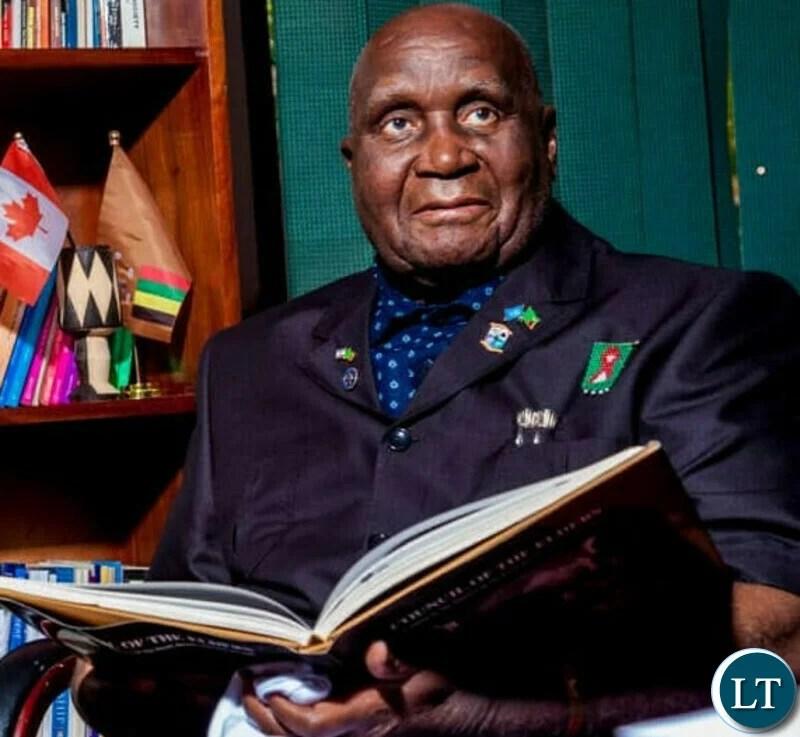Africa-Press – Zambia. In Zambia, the honour of ‘Father of the Nation’ formally belongs to founding president Kenneth Kaunda, who retains it even in death, as it is neither inheritable nor transferable. (Although the honour of ‘Father of the Nation’ is already taken, the title of Zambia’s ‘Father of Corruption’ is still available or up for grabs. With many worthy candidates, the competition is stiff.)
The ‘Father of the Nation’ honour was conferred on Kaunda by President Levy Mwanawasa at a specially organised state ceremony on 15 January 2003 in recognition of his role in the liberation of Zambia and the creation of the newly independent country.
The phrase ‘Father of the Nation’ gained considerable currency in recent times, but it has long historical roots. It goes back to the emergence of nations such as the United States of America in the eighteenth century whose constitutional writers became known as the ‘Founding Fathers’ in subsequent years.
It was also previously used to refer to the rulers of the British (e.g., King George III who reigned from 1738 to1820) and Late Ottoman (e.g., the Sultan) empires who were seen as watching over and caring for all their subjects as a way of consolidating their power and unifying people of different faiths, ethnic, and social origins into one political body or ‘nation-state’.
In the early and middle parts of the twentieth century, the ‘Father of the Nation’ concept was appropriated by dictators in countries such as Zaire, Russia, and North Korea as a coercive strategy of reinforcing their authority and building legitimacy. Attempts to challenge such rulers were often criminalised, as they were seen as a direct threat to the unity, harmony, and healthy body of the nation-state as a whole. Personality cults emerged within this context as collaborative interactional enterprises jointly created, modified, and sustained by cultic leaders and their followers.
In Africa, the idea of ‘Father of the Nation’ is closely tied to the struggle against colonialism. Following the achievement of independence or majority rule, African nationalists who had formally led the struggle against colonial rule and white minority regimes became known as ‘Founding Fathers’ in their respective countries. The individual figures who, for strategic reasons, served as the spearhead of the nationalist movement in each country, mainly those who went on to become the first presidents of the newly created independent states, were accorded the honour of ‘Father of the Nation’ in recognition of the effective leadership they provided during the liberation struggle and rendered to the cause of nation building in the early years of independence.
These included Léopold Senghor in Senegal, Jomo Kenyatta in Kenya, Julius Nyerere in Tanzania, Kwame Nkrumah in Ghana, Nnamdi Azikiwe in Nigeria, Nelson Mandela in South Africa, Sam Nujoma in Namibia, both Joshua Nkomo and Robert Mugabe in Zimbabwe, and indeed Kaunda in Zambia.
As is the case with several countries in Africa, Zambia did not exist before the achievement of independence, so the title of ‘Father of the Nation’ almost has a literal meaning, equivalent to actually “giving birth to” a nation. This is because the first president and his nationalist colleagues had to name the territory and create a cohesive nation from previously self-governing ethnic-language groups that had, prior to the imposition of colonial rule, existed as independent kingdoms.
Mwanawasa’s recognition of Kaunda as ‘Father of the Nation’ was also a rehabilitation of the stature of the founding president after the horrible treatment that he suffered at the hands of the Fredrick Chiluba-led MMD administration over the course of the 1991-2001 period. For instance, following his removal from office in 1991, Kaunda was stripped of his Zambian citizenship before the government tried to have him deported to Malawi, from where his parents originated. When this plan failed, the MMD, fearful of defeat, introduced a constitutional clause that required a presidential candidate to have both parents born in Zambia, effectively excluding Kaunda from running in the 1996 elections and prompting the main opposition party, UNIP, to boycott the polls.
Kaunda also survived an assassination attempt on 23 August 1997 when police opened fire on a mass rally he was addressing as head of an 11-opposition party alliance, nearly killing him. (Another opposition leader, Rodger Chongwe, needed emergency surgery after the same bullet that wounded Kaunda hit him.) A few months later, Kaunda was arrested, alongside 80 others, and charged with treason in connection with a failed coup attempt against Chiluba in October 1997. After spending months in Mukobeko Maximum Security Prison, the state dropped the treason charge against him on 1 June 1998 when trial was due to start.
What is deeply problematic about the notion of ‘Father of the Nation’ is that it reinforces patriarchal tendencies by overlooking the fundamental role of women in the liberation struggle and the creation of Zambia. In other words, the struggle for independence was not fought by men alone. In fact, no historic struggle has ever been fought and won by men only. This begs the question: if Kenneth Kaunda is the ‘Father of the Nation’, who is Zambia’s ‘Mother of the Nation’? After all, to have a father, there must be a mother, no?
For More News And Analysis About Zambia Follow Africa-Press







